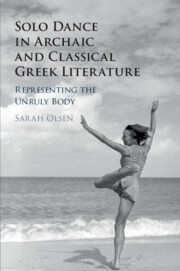Book contents
- Solo Dance in Archaic and Classical Greek Literature
- Solo Dance in Archaic and Classical Greek Literature
- Copyright page
- Dedication
- Contents
- Figures
- Acknowledgments
- Notes on Texts, Abbreviations, and Style
- Introduction
- Chapter 1 The Fantastic Phaeacians
- Chapter 2 Io’s Dance
- Chapter 3 Dance at Work
- Chapter 4 Dance and Dissonance
- Chapter 5 Staging Madwomen
- Chapter 6 Agency, Narrative, and the Dancing Girl
- Chapter 7 Dance History
- Conclusion
- Bibliography
- Index Locorum
- General Index
Chapter 5 - Staging Madwomen
Dance and Dramatic Form in Euripides and Aristophanes
Published online by Cambridge University Press: 30 November 2020
- Solo Dance in Archaic and Classical Greek Literature
- Solo Dance in Archaic and Classical Greek Literature
- Copyright page
- Dedication
- Contents
- Figures
- Acknowledgments
- Notes on Texts, Abbreviations, and Style
- Introduction
- Chapter 1 The Fantastic Phaeacians
- Chapter 2 Io’s Dance
- Chapter 3 Dance at Work
- Chapter 4 Dance and Dissonance
- Chapter 5 Staging Madwomen
- Chapter 6 Agency, Narrative, and the Dancing Girl
- Chapter 7 Dance History
- Conclusion
- Bibliography
- Index Locorum
- General Index
Summary
Chapter Five brings tragedy and comedy together to explore the links between female solo dance and madness in Euripides and Aristophanes. I begin by considering two instances of female dance that are described – but not performed – on the Athenian stage: Agave’s movement surrounding the murder of Pentheus in Euripides’ Bacchae and the dance of Demostratus’ wife in Aristophanes’ Lysistrata. I argue that the projection of these dances outside the theatrical space itself exposes anxieties about the unruliness of female bodies engaged in ritual performance – especially the singular dancer separated from the chorus. I conclude with a contrasting example, exploring how Cassandra’s performance in Euripides’ Trojan Women brings mad female dancing onstage, and, like Io’s dance in Prometheus Bound (Ch. 2), tests the bounds of tragic theatricality.
- Type
- Chapter
- Information
- Solo Dance in Archaic and Classical Greek LiteratureRepresenting the Unruly Body, pp. 129 - 149Publisher: Cambridge University PressPrint publication year: 2020

